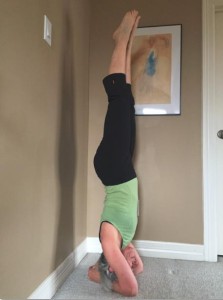When I was a child, I completely bought into the “Happily ever after” myth. Life would only get better, once I grew up. I would find my handsome prince, have 2.3 children, and live in a house in the suburbs with a dog and a white picket fence. Everything would be easy, and we would be happy.
Ha!
There are times when life is good, and things are easy, and we are happy. But “this too shall pass.” My older friends have said that old age is not for sissies. Maybe getting older is more difficult, and we have passed the easy parts of life. Does that mean we have passed the happy parts, too?
My husband and I practice yoga daily. Our practice is both easy and difficult. Some postures are easy one day and not the next. Our bodies might ache in one spot one day, and in another spot the next day. Some days, just getting onto the mat in the yoga room and starting our practice is hard. Other days our practice is easy and makes us happy.
 Why doesn’t a daily practice get easier every time? If we are going to the edge of our comfort zone – in yoga or in life – which is necessary for growth, there will always be a certain level of difficulty. But difficulty does not necessarily mean unhappy.
Why doesn’t a daily practice get easier every time? If we are going to the edge of our comfort zone – in yoga or in life – which is necessary for growth, there will always be a certain level of difficulty. But difficulty does not necessarily mean unhappy.
How do we handle the not-easy things? How can we create happiness in the face of difficulty?
• Recognize that things change. What is difficult today may be easy tomorrow. What is easy today may be difficult tomorrow. This recognition can take the sting out of the difficulty. It helps us not take it personally.
• The difficulty may be showing you where you need to do more work. Accept the lesson gracefully (and gratefully).
• Assess the difficulty itself. If it is physical, then we must decide how to treat it: by doing more, or doing less, or something else? What are the ramifications of each path? Doing more could possibly exacerbate the difficulty, but doing less could create a chronic weakness. A body worker or physical therapist might be helpful.
• If the difficulty is emotional, then Process tools can come into play. Determine the source of the discomfort (Levels of Truth work well here). If it is a negative pattern, where did it come from? Can you forgive yourself for having that reaction/pattern? Can you transform the negative pattern into a positive one? (Use recycling of negative traits.) If the difficulty persists, additional therapy might be indicated.
• Recognition of what is going well in your life is always useful. It can put the difficulties in perspective, lessening their impact on your happiness.
Just because things are difficult is no reason to avoid them. When we develop the will and the discipline to continue on through the difficulties (a dialog with one’s higher self might help here), we gain the satisfaction of working through the problem. The path to happiness is opened when we move toward acceptance, forgiveness, and love: the states of mind that bring inner peace. Maybe that is what happiness is.